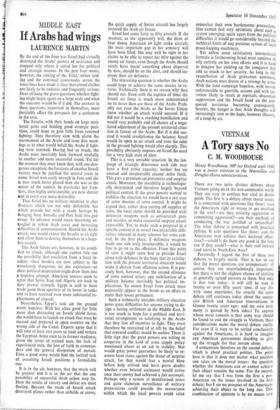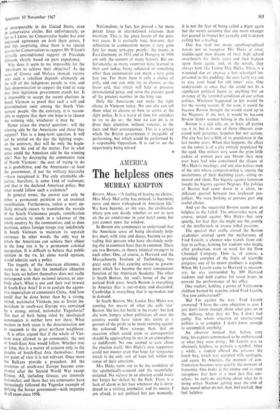A Tory says No
VIETNAM C. M. WOODHOUSE
Monty Woodhouse, MP for Oxford until 1966, was a junior minister in the Macmillan and Douglas-Home administrations.
There are two quite distinct debates about Vietnam going on in the non-cominunist world. They are easy to confuse but vital to distin- guish. The first is a debate about moral issues. It is concerned with questions like these: were the Americans right or wrong to get involved in the war?—are they resisting aggression or committing aggression?—are their methods of conducting the war justified or unjustified? The other debate is concerned with practical politics. It asks questions like these: can the Americans ever achieve their declared objec- tives?—would it do them any good in the long run if they could?—what is their real interest (and ours) in South-East Asia?
Personally I regard the first of these two debates as largely sterile. That is not to say that the moral questions ire unimportant: of course they are overwhelmingly important; but there is not the slightest chance of arriving at generally agreed answers to them. Not only is that true today : it will still be true in twenty or even fifty years' time. (I say this with some experience, for exactly the same debate still continues today about the succes- sive British and American interventions in Greece twenty years ago: and my own testi- mony is quoted by both sides.) To anyone whose main concern is that some way should be found to end the struggle in Vietnam, these considerations make the moral debate sterile. For even if it were to be settled conclusively against the Americans, it is hard to imagine any American government deciding to give up the struggle for that reason alone.
I concentrate therefore on the second debate, which is about practical politics. The point here is that it does not matter what position one takes on the moral issues : the question whether the Americans can or cannot achieve their object remains the same. For the record, let me say that I was from the first a pro- American on the issues involved in the first debate; but I see no prospect of the Americans achieving their object in the long run. This combination of opinions is by no means rare
or unrespectable in the United States, even in conservative circles. But unfortunately, so far as I know, no Conservative leader has ever expressed agreement on both these points. I find this surprising, since there is no special reason for Conservatives to support Mr Wilson's virtually unconditional support of President Johnson, clearly based on pure expediency.
Why does it seem to me impossible for the Americans to achieve their objective? As the cases of Greece and Malaya showed, victory over such a rebellion depends ultimately on the will of the indigenous people to win, and their determination to support the kind of state that their legitimate government stands for. It is impossible to accept the recent elections in South Vietnam as proof that such a will and determination exist among the South Viet- namese people. On the contrary, it is reason- able to suppose that their one hope is to choose the winning side, whichever it may be.
Hence arises the crucial question: will the winning side be the Americans and those they support? This is a long-term question. It will not be settled on the day the fighting stops: on the contrary, that will be only the begin- ning, not the end of the matter. For in what sense could the American side be the winning side? Not by destroying the communist state of North Vietnam: the cost of trying to do so is prohibitive, and the Americans—at least the government, if not the military hierarchy —have recognised it. The only attainable ob- jective, therefore, is some kind of stalemate; and that is the declared American policy. But what would follow such a stalemate?
In general terms, the answer can only be either a permanent partition or an eventual reunification. Furthermore, unless a most un- likely miracle occurs to transform the morale of the South Vietnamese people, reunification seems certain to result in a takeover of the whole country by the communists; and so does partition, unless foreign troops stay indefinitely in South Vietnam to maintain its separate existence. In other words, the only way in which the Americans can achieve their object in the long run is by a permanent colonial occupation. It is difficult to believe that public opinion in the us, let alone world opinion, would tolerate such a policy.
The tragedy of the American dilemma, it seems to me, is that the immediate objective they have set before themselves does not really correspond with their national interest, or any- body else's. What is our and their real interest in South-East Asia? It is to contain the aggres- sive imperialism of communist China. And how could that be done better than by a strong, united, nationalist Vietnam, just as Soviet im- perialism in south-east Europe was contained by a strong, united, nationalist Yugoslavia? The fact of both being ruled by ideological communists is neither here nor there. What matters in both cases is the determination not to succumb to the great northern neighbour.
It is often argued that if the whole of Viet- nam were allowed to go communist, the rest of South-East Asia would follow. Whether true or false, this is a matter of concern only to the peoples of South-East Asia themselves: from our point of view it is not relevant. Once more the Balkans provide a precedent. All the countries of south-east Europe became com- munist after the Second World War except Greece. All, including Greece, are intensely nationalist; and those that are communist have increasingly followed the Yugoslav example of defying the Soviet government—with impunity in all cases since 1956.
Nationalism, in fact, has proved a far more potent force in international relations than marxism. This is the great lesson of the post- war years. It is perfectly true, however, that subjection to communism means a very grim fate for many unhappy people: the events in East Germany in 1953 and in Hungary in 1956 are only the summit of many horrors. But un- fortunately, as many countries have learned to their cost today, being subjected to something other than communism can mean a very grim fate too. For them there is only a choice of evils, and one can only try to choose, as the lesser evil, that which will help to preserve international peace and serve the greatest good of the greatest number in the long run.
Only the Americans can make the right choice in Vietnam today. No one else can tell them what to choose or how to arrive at the right policy. It is a waste of time for outsiders to try to do so: the best we can do is to draw their attention, without rancour, to the facts and their consequences. This is a service which the British government is incapable of performing, but which could be performed by a responsible Opposition. It is sad to see the opportunity being missed.







































 Previous page
Previous page